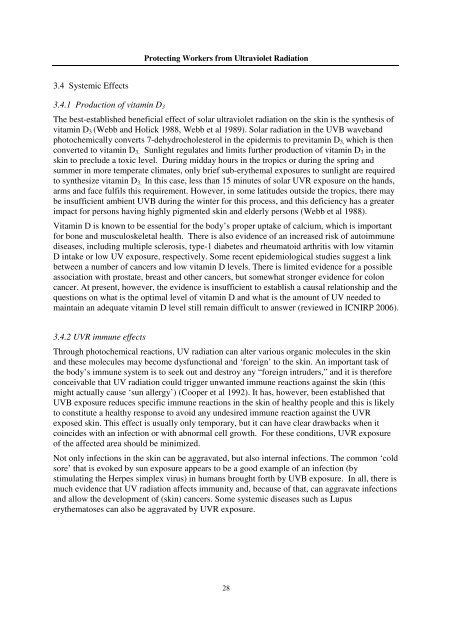Protecting Workers from Ultraviolet Radiation - icnirp
Protecting Workers from Ultraviolet Radiation - icnirp
Protecting Workers from Ultraviolet Radiation - icnirp
Create successful ePaper yourself
Turn your PDF publications into a flip-book with our unique Google optimized e-Paper software.
3.4 Systemic Effects<br />
3.4.1 Production of vitamin D3<br />
<strong>Protecting</strong> <strong>Workers</strong> <strong>from</strong> <strong>Ultraviolet</strong> <strong>Radiation</strong><br />
The best-established beneficial effect of solar ultraviolet radiation on the skin is the synthesis of<br />
vitamin D3 (Webb and Holick 1988, Webb et al 1989). Solar radiation in the UVB waveband<br />
photochemically converts 7-dehydrocholesterol in the epidermis to previtamin D3, which is then<br />
converted to vitamin D3. Sunlight regulates and limits further production of vitamin D3 in the<br />
skin to preclude a toxic level. During midday hours in the tropics or during the spring and<br />
summer in more temperate climates, only brief sub-erythemal exposures to sunlight are required<br />
to synthesize vitamin D3. In this case, less than 15 minutes of solar UVR exposure on the hands,<br />
arms and face fulfils this requirement. However, in some latitudes outside the tropics, there may<br />
be insufficient ambient UVB during the winter for this process, and this deficiency has a greater<br />
impact for persons having highly pigmented skin and elderly persons (Webb et al 1988).<br />
Vitamin D is known to be essential for the body’s proper uptake of calcium, which is important<br />
for bone and musculoskeletal health. There is also evidence of an increased risk of autoimmune<br />
diseases, including multiple sclerosis, type-1 diabetes and rheumatoid arthritis with low vitamin<br />
D intake or low UV exposure, respectively. Some recent epidemiological studies suggest a link<br />
between a number of cancers and low vitamin D levels. There is limited evidence for a possible<br />
association with prostate, breast and other cancers, but somewhat stronger evidence for colon<br />
cancer. At present, however, the evidence is insufficient to establish a causal relationship and the<br />
questions on what is the optimal level of vitamin D and what is the amount of UV needed to<br />
maintain an adequate vitamin D level still remain difficult to answer (reviewed in ICNIRP 2006).<br />
3.4.2 UVR immune effects<br />
Through photochemical reactions, UV radiation can alter various organic molecules in the skin<br />
and these molecules may become dysfunctional and ‘foreign’ to the skin. An important task of<br />
the body’s immune system is to seek out and destroy any “foreign intruders,” and it is therefore<br />
conceivable that UV radiation could trigger unwanted immune reactions against the skin (this<br />
might actually cause ‘sun allergy’) (Cooper et al 1992). It has, however, been established that<br />
UVB exposure reduces specific immune reactions in the skin of healthy people and this is likely<br />
to constitute a healthy response to avoid any undesired immune reaction against the UVR<br />
exposed skin. This effect is usually only temporary, but it can have clear drawbacks when it<br />
coincides with an infection or with abnormal cell growth. For these conditions, UVR exposure<br />
of the affected area should be minimized.<br />
Not only infections in the skin can be aggravated, but also internal infections. The common ‘cold<br />
sore’ that is evoked by sun exposure appears to be a good example of an infection (by<br />
stimulating the Herpes simplex virus) in humans brought forth by UVB exposure. In all, there is<br />
much evidence that UV radiation affects immunity and, because of that, can aggravate infections<br />
and allow the development of (skin) cancers. Some systemic diseases such as Lupus<br />
erythematoses can also be aggravated by UVR exposure.<br />
28



